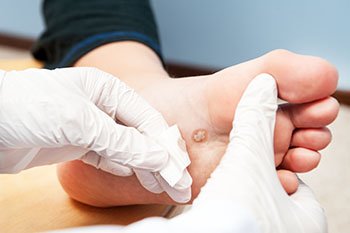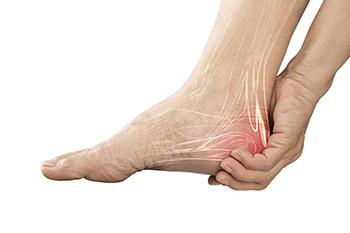Connect With Us
Blog

Chronic tendon injuries in the foot and ankle happen when a tendon becomes irritated or damaged over time, often due to overuse, poor foot mechanics, or past injuries that did not fully heal. Examples include Achilles tendinopathy and posterior tibial tendon dysfunction. These conditions can cause long-lasting pain, stiffness and weakness, especially during activity. Treatment focuses on reducing stress on the tendon and supporting healing. This may involve rest, custom orthotics, stretching and strengthening exercises, targeted exercises, or anti-inflammatory treatments. In more severe cases, advanced therapies or surgery may be considered. Chronic tendon injuries do not usually improve on their own and can worsen if left untreated. If you have ongoing foot or ankle pain that seems to flare up during movement or does not go away with rest, it is suggested that you see a podiatrist for proper evaluation and care.
Achilles tendon injuries need immediate attention to avoid future complications. If you have any concerns, contact one of our podiatrists of Southwest Podiatry. Our doctors can provide the care you need to keep you pain-free and on your feet.
What Is the Achilles Tendon?
The Achilles tendon is a tendon that connects the lower leg muscles and calf to the heel of the foot. It is the strongest tendon in the human body and is essential for making movement possible. Because this tendon is such an integral part of the body, any injuries to it can create immense difficulties and should immediately be presented to a doctor.
What Are the Symptoms of an Achilles Tendon Injury?
There are various types of injuries that can affect the Achilles tendon. The two most common injuries are Achilles tendinitis and ruptures of the tendon.
Achilles Tendinitis Symptoms
- Inflammation
- Dull to severe pain
- Increased blood flow to the tendon
- Thickening of the tendon
Rupture Symptoms
- Extreme pain and swelling in the foot
- Total immobility
Treatment and Prevention
Achilles tendon injuries are diagnosed by a thorough physical evaluation, which can include an MRI. Treatment involves rest, physical therapy, and in some cases, surgery. However, various preventative measures can be taken to avoid these injuries, such as:
- Thorough stretching of the tendon before and after exercise
- Strengthening exercises like calf raises, squats, leg curls, leg extensions, leg raises, lunges, and leg presses
If you have any questions please feel free to contact our offices located in Dallas, and Carrollton, TX . We offer the newest diagnostic tools and technology to treat your foot and ankle needs.

Plantar warts are growths that appear on the soles of the feet, caused by the human papillomavirus, or HPV. They often develop in areas of pressure, like the heel or ball of the foot, and can sometimes combine to form a condition known as mosaic warts. Mosaic warts are clusters of multiple warts that spread out across a larger area, creating a patchy, rough surface. These warts can cause pain, especially when walking or standing for long periods. They often look like small, rough bumps with black dots in the center, which are blood vessels. The area susrrounding the wart may become hardened and calloused. A podiatrist can diagnose and treat plantar warts through various methods, including cryotherapy or freezing, laser treatment, and minor surgery. They may also provide topical treatments and advice on preventing the spread of the virus. If you have this condition, it is suggested that you schedule an appointment with a podiatrist for appropriate care.
Plantar warts can be very uncomfortable. If you need your feet checked, contact one of our podiatrists from Southwest Podiatry. Our doctors will assist you with all of your foot and ankle needs.
About Plantar Warts
Plantar warts are the result of HPV, or human papillomavirus, getting into open wounds on the feet. They are mostly found on the heels or balls of the feet.
While plantar warts are generally harmless, those experiencing excessive pain or those suffering from diabetes or a compromised immune system require immediate medical care. Plantar warts are easily diagnosed, usually through scraping off a bit of rough skin or by getting a biopsy.
Symptoms
- Lesions on the bottom of your feet, usually rough and grainy
- Hard or thick callused spots
- Wart seeds, which are small clotted blood vessels that look like little black spots
- Pain, discomfort, or tenderness of your feet when walking or standing
Treatment
- Freezing
- Electric tool removal
- Laser Treatment
- Topical Creams (prescription only)
- Over-the-counter medications
To help prevent developing plantar warts, avoid walking barefoot over abrasive surfaces that can cause cuts or wounds for HPV to get into. Avoiding direct contact with other warts, as well as not picking or rubbing existing warts, can help prevent the further spread of plantar warts. However, if you think you have developed plantar warts, speak to your podiatrist. He or she can diagnose the warts on your feet and recommend the appropriate treatment options.
If you have any questions please feel free to contact our offices located in Dallas, and Carrollton, TX . We offer the newest diagnostic and treatment technologies for all your foot and ankle needs.

Heel pain is a common complaint that can result from various conditions affecting the foot. Plantar fasciitis is a leading cause, involving inflammation of the thick band of tissue that supports the arch, leading to sharp pain in the heel. Achilles tendonitis occurs when the tendon connecting the calf to the heel becomes irritated, often due to overuse. Bursitis, the inflammation of fluid-filled sacs that cushion the heel, can cause tenderness and discomfort. Additionally, heel spurs, bony growths on the heel bone, may develop due to repeated strain and pressure. Risk factors for heel pain include excessive walking or running, wearing improper footwear, obesity, and structural foot issues. Heel pain can cause difficulty in completing daily activities. If this applies to you, it is suggested that you promptly schedule an appointment with a podiatrist who can offer appropriate treatment remedies.
Many people suffer from bouts of heel pain. For more information, contact one of our podiatrists of Southwest Podiatry. Our doctors can provide the care you need to keep you pain-free and on your feet.
Causes of Heel Pain
Heel pain is often associated with plantar fasciitis. The plantar fascia is a band of tissues that extends along the bottom of the foot. A rip or tear in this ligament can cause inflammation of the tissue.
Achilles tendonitis is another cause of heel pain. Inflammation of the Achilles tendon will cause pain from fractures and muscle tearing. Lack of flexibility is also another symptom.
Heel spurs are another cause of pain. When the tissues of the plantar fascia undergo a great deal of stress, it can lead to ligament separation from the heel bone, causing heel spurs.
Why Might Heel Pain Occur?
- Wearing ill-fitting shoes
- Wearing non-supportive shoes
- Weight change
- Excessive running
Treatments
Heel pain should be treated as soon as possible for immediate results. Keeping your feet in a stress-free environment will help. If you suffer from Achilles tendonitis or plantar fasciitis, applying ice will reduce the swelling. Stretching before an exercise like running will help the muscles. Using all these tips will help make heel pain a condition of the past.
If you have any questions please contact our offices located in Dallas, and Carrollton, TX . We offer the newest diagnostic and treatment technologies for all your foot and ankle needs.

